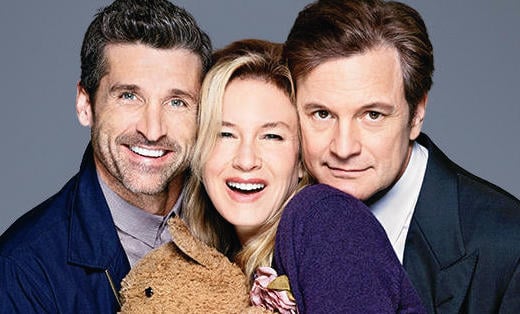DATEWORTHY? Yes, but be forewarned that its attitudes and jokes about sex are pretty casual early on, before the story develops into a more moral storyline with a surprisingly pro-life attitude.
When Renee Zellweger burst into fame as Tom Cruise’s quirky, humble girlfriend in “Jerry McGuire” back in 1996, her impish look and shy girlish voice endeared her instantly to audiences worldwide. She managed to build a solid career quickly, even winning a Best Supporting Actress Oscar for “Cold Mountain,” but her biggest success came taking on the title role in the critically acclaimed 2001 film adaptation of the wildly popular best-selling novel, “Bridget Jones’s Diary.”
In it, she played a single woman who had given up all hope of love, but decided to improve herself over the course of a year while looking for love and recording all the results in her diary. She found herself the object of affection for two dashing men played by Colin Firth and Hugh Grant, giving hope to lovelorn people everywhere that they could still attract the perfect partner.
Its 2004 sequel, “Bridget Jones: The Edge of Reason,” changed directors from the original’s Sharon McGuire and wasn’t nearly as popular – or good. The movie featured the same trio of stars, but as Bridget questioned whether she was really happy with her new relationship. And within a year or two, Zellweger started choosing a whole string of critically dismissed bombs, ultimately dropping off the film biz radar completely about five years ago.
But now both Zellweger and her most famous character, Bridget, are back with “Bridget Jones’s Baby.” It could have seemed like a pointless addition or a desperate cash grab, but instead the movie is thankfully the best and funniest in the bunch – no doubt due to the return of McGuire in the director’s chair. (This recommendation indeed comes with moral caveats I address later in the review.)
This time Bridget has to figure out which of two men – one from her past, and one new one – fathered her child, “Baby” starts out by finding Bridget alone and sad at age 43. Of course, she is comically portrayed in her sadness, and her best friend offers to take her to a wild rock music festival and encourages her to have sex with the first man she meets.
That man is Mark (Patrick Dempsey), a dashingly handsome American businessman who has invented a new phone app for dating. She falls into bed with him, then unwittingly leaves in the morning while he’s out bringing her breakfast.
She next goes to a funeral, where she runs into her old flame Mark Darcy (Colin Firth), who is sweet but stodgy and now has a wife. But when they re-meet at a party following a christening, he reveals that he’s separated from his wife and she seduces him.
Soon, Bridget is pregnant and realizes that she can’t tell who the father is since she had sex with the two men just days apart. Her doctor (Emma Thompson) advises her to tell both men about the baby, setting off a competition between the men to prove each is the better father (or rather, father-in-waiting) in the hopes of winning both her love and the child for an instant family.
“Baby” has a lot of foul language and sexual euphemisms used comedically, but Zellweger invests Jones with such sweetness that it’s hard to take as much offense with her as with almost any other character in a typical movie. That isn’t to excuse the immoral behavior, but the tone of the movie makes it easier to enjoy as Bridget goes through the life events that eventually do lead to positive, moral decisions.
The sex scenes are basically racy foreplay, stronger than in most comedies yet cutting away before going very long or graphic. The movie’s attitude towards casual sex is nonchalant initially, and the fact that she pairs up with the merely separated Darcy is questionable by any standard, Catholic or not.
One other troublesome aspect is a running gag of Bridget’s mother running for her parish council, first opposing gay rights but eventually fully embracing the issues and the people in over the top comedic fashion. While somewhat funny in spite of itself, these moments add nothing to the main plot and could have easily been left out.
In another scene, a lesbian couple is shown in a parenting discussion group, with the two potential fathers of Bridget’s baby mistakenly believed to be a gay couple with Bridget as a surrogate mother.
On the positive side, the movie never questions for a second that Bridget wants her unexpected pregnancy, and the pregnancy and babies are shown as being wonderful throughout to the point that it’s basically a pro-life message.
SPOILER: Also, when Bridget does figure out which of the two men she truly loves, she has a church wedding with him. END SPOILER.
Thus, this is a movie that sounds more morally questionable on paper than it actually plays onscreen. There is a place in storytelling that can show characters who are making mistakes with their lives as long as they work towards a more positive moral lifestyle, and this is one of those films – albeit just for adults.



